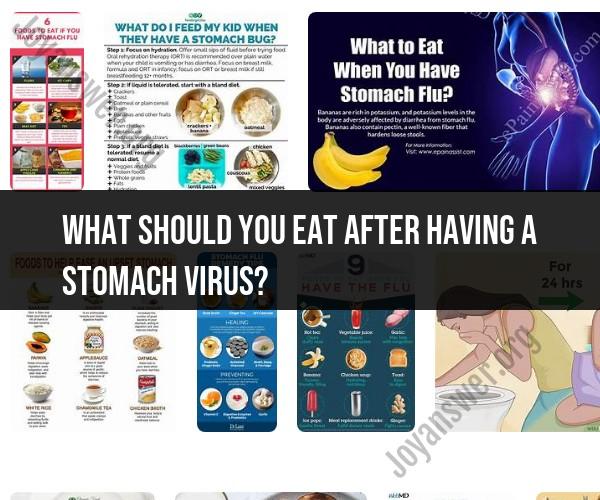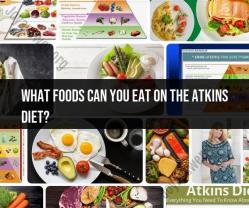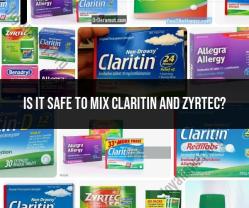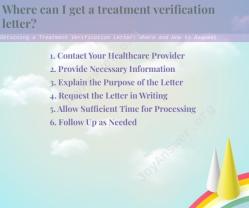What should you eat after having a stomach virus?
After recovering from a stomach virus, it's essential to choose foods that are gentle on your digestive system and help you regain your strength and hydration. Here are some dietary guidelines on what to eat after having a stomach virus:
Clear Liquids:
- Start with clear liquids like water, clear broths, and herbal teas. Sip these fluids slowly throughout the day to prevent dehydration.
Oral Rehydration Solutions (ORS):
- Consider drinking oral rehydration solutions available at pharmacies. These solutions help restore electrolyte balance and are especially useful if you experienced diarrhea and vomiting.
BRAT Diet:
- The BRAT diet consists of easily digestible foods: Bananas, Rice, Applesauce, and Toast. These foods are low in fiber and can help soothe your stomach.
Plain Crackers or Biscuits:
- Plain crackers or biscuits are mild and can provide some energy without irritating your stomach.
Boiled or Steamed Potatoes:
- Potatoes can be boiled or steamed until they are soft and easy to digest. Avoid adding butter or spices.
Boiled Chicken or Turkey:
- Lean poultry that has been boiled without added spices or seasonings can provide protein without excessive fat.
Oatmeal or Cream of Wheat:
- These hot cereals can be soothing and easy to digest when prepared with water or a small amount of milk.
Applesauce and Pearsauce:
- Unsweetened applesauce or pearsauce can provide some nutrition and fiber without being too harsh on your stomach.
Yogurt (Plain or Low-Fat):
- Plain yogurt contains probiotics that can help restore healthy gut bacteria. Opt for low-fat or non-fat varieties.
Ginger:
- Ginger, in the form of ginger tea or ginger ale (preferably flat and without carbonation), can help alleviate nausea.
Avoid Spicy, Greasy, and Dairy-rich Foods:
- Stay away from spicy foods, greasy or fried foods, and dairy products like cheese and milk until your stomach has fully recovered, as these can be harder to digest.
Small, Frequent Meals:
- Instead of large meals, opt for smaller, more frequent meals to reduce the strain on your digestive system.
Stay Hydrated:
- Continue to drink plenty of fluids even after you start eating solid foods. Dehydration can be a concern after a stomach virus.
Listen to Your Body:
- Pay attention to your body's signals. If a particular food or drink causes discomfort or worsens your symptoms, avoid it.
It's essential to reintroduce foods gradually and observe how your body responds. As you start feeling better, you can progressively incorporate a wider variety of foods into your diet. If you experience severe or prolonged symptoms, or if you have concerns about your recovery, consult a healthcare provider for guidance and monitoring.
Post-Stomach Virus Recovery Diet: What to Eat for Healing
After a stomach virus, your body needs time to heal. This means eating bland, easy-to-digest foods that are gentle on your stomach. The BRAT diet (bananas, rice, applesauce, and toast) is a good place to start. These foods are low in fiber and fat, and they are easy to digest.
Once your stomach starts to feel better, you can gradually add other foods to your diet. Here are some tips for creating a post-stomach virus recovery diet:
- Eat small, frequent meals throughout the day. This will help to reduce your stomach workload and prevent nausea.
- Choose bland, easy-to-digest foods. Some good options include bananas, rice, applesauce, toast, crackers, yogurt, and broth.
- Avoid foods that are greasy, spicy, or acidic. These foods can irritate your stomach and make your symptoms worse.
- Drink plenty of fluids to stay hydrated. Water is the best choice, but you can also drink clear broths, sports drinks, or coconut water.
Nourishing Your Body After a Stomach Virus: Dietary Guidelines
Here are some additional dietary guidelines for nourishing your body after a stomach virus:
- Eat plenty of fruits and vegetables. Fruits and vegetables are packed with vitamins, minerals, and antioxidants that can help your body heal.
- Choose lean protein sources. Lean protein sources, such as chicken, fish, and beans, can help to repair muscle tissue and support immune function.
- Avoid sugary drinks and processed foods. Sugary drinks and processed foods can irritate your stomach and make your symptoms worse.
- Listen to your body. If a certain food bothers you, avoid it.
Stomach Virus Nutrition: Foods to Soothe and Rehydrate
Here are some specific foods that can help to soothe and rehydrate your body after a stomach virus:
- Bananas: Bananas are a good source of potassium, which can help to replace electrolytes lost through vomiting and diarrhea.
- Rice: Rice is a bland, easy-to-digest food that is low in fiber.
- Applesauce: Applesauce is another bland, easy-to-digest food that is low in fiber. It is also a good source of pectin, which can help to solidify stool.
- Toast: Toast is a bland, easy-to-digest food that is low in fiber. It is also a good source of carbohydrates, which can provide energy.
- Crackers: Crackers are another bland, easy-to-digest food that is low in fiber. They can be helpful for settling nausea.
- Yogurt: Yogurt is a good source of probiotics, which are beneficial bacteria that can help to restore balance to your gut flora.
- Broth: Broth is a good source of electrolytes and fluids. It can be helpful for rehydrating your body after vomiting and diarrhea.
If you have any questions or concerns about your post-stomach virus recovery diet, be sure to talk to your doctor or a registered dietitian. They can help you to create a personalized plan that meets your individual needs.











